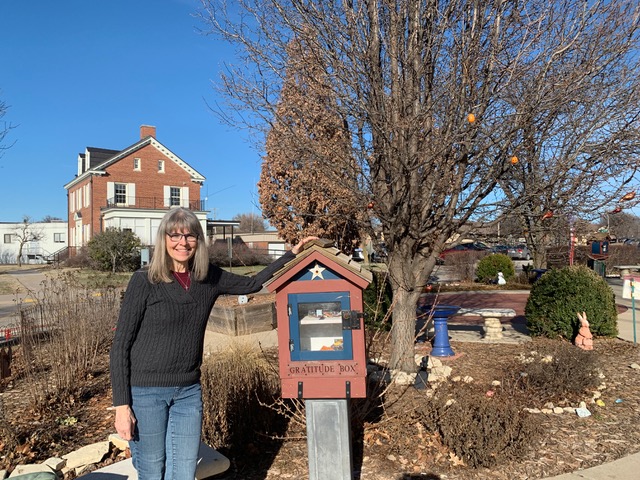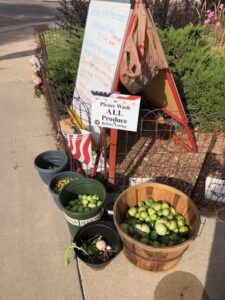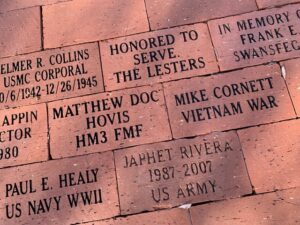Laura Nutter was turning the soil for a new garden on the grounds of the VA hospital when it already started to accomplish its goal.
Richard Manning, a Marine veteran, was going through counseling in Building 5 at the hospital at the time and would come outside and sit on a step overlooking the then-empty plot.
“I didn’t know it was a peace garden or anything else,” said Manning, who served in Vietnam from 1967 to 1969. “I would sit and contemplate and try to digest everything I’d just been through.”
Eleven years and thousands of pounds of tomatoes and potatoes later, the garden just inside the east entrance of the hospital has helped not only Manning — who gardens there now — but other veterans who rest there, get fresh produce or do a little gardening themselves. It also gives their families and grateful benefactors a place to honor them and VA employees a place to relax.
“It’s the best-kept secret at the VA,” Nutter’s husband, Mark, said of the Robert J. Dole VA Memorial Peace Garden. He spearheads the sale of $50 bricks that honor living and deceased veterans and that help pay for the garden. The bricks form a Circle of Honor within it.
“Our mission is to help veterans through therapeutic gardening,” Laura Nutter said. “A lot of things they can’t grow in their place of residence. This gives them a chance to do something productive in a social environment and learn things.”
The garden has been a place of solace and joy for Nutter herself. It started as a seed: She wanted to do something at the VA to honor her father, Donald Kolar, an Air Force veteran who took his life on a frigid February day in 2011. “He loved the VA and the care he got there,” Nutter said. “We thought that was the best place to remember him. I was expecting to do a bush and a bench.”
But the idea grew as she consulted with a therapy nurse who had been wanting to do a therapy garden at the VA. Now through its blossoming, Nutter wants people to know that there is always hope, even on days when nothing seems to be growing. Everything she does in the garden is meant to urge veterans to persevere and not give up.
“That message is so important to me,” Nutter said. “Dad loved gardening as therapy and loved to give away produce. At the VA garden, veterans can pick their own tomatoes or help themselves from buckets of vegetables and apples that volunteers harvest.
Manning, the Marine veteran, did not initially talk to Nutter as she prepared the ground for the garden. “Most of us are pretty close-mouthed,” he said of his fellow veterans. But he sat and admired her energetic work. “As time went on I got more open to begin listening to other people. … I had to do something to get out of the cocoon I was in.”
As someone who had always had an interest in gardening, he eventually became a Sedgwick County Extension master gardener and then started to help in the VA garden. He now advises other veterans to let the garden unfold slowly for them as it did for him. It’s open 24/7.
“Go out and enjoy it. … Sit there, maybe with your coffee, just thinking, and be open to thought.”
There are a variety of ways people can work in the garden. Those who don’t know how to garden can come and learn. Veterans can bring a plant, get it potted and taken care of it in the garden. Everything is provided — tools, instructions, support.
If a person doesn’t want to get down on the ground, there are other tasks: sweeping walks, feeding the birds and cleaning after the birds. “We try to keep it respectful and neat,” Nutter said. There are also raised beds and a tabletop garden.
“We encourage people with disabilities to come and join us.”
The main communal event of the week is the “Garden Group” that meets at 9:30 a.m. Fridays and is starting up again in March after being off for the winter. “People can partner with someone or take on a task and get all the advice they need,” Nutter said. “We take breaks and have refreshments.”
Nutter is hoping some new helpers show up because some of the current ones are aging and cutting back on their time in their garden.
“It’s a labor of love,” said Maren Breit, a master gardener from Maize who’s been helping and teaching in the garden since 2017. “I’m very excited to see a new person in the garden so I can introduce them to it. It’s something I believe in. I come from a military family, and it’s something I can do.”
Nutter believes help will come. She’s seen countless “God winks” through her time in the garden — people showing up at just the right time to fill a need.
“I never would have expected to have found this much joy from my father’s event,” Nutter said. “It’s the message of Easter — when something that looks bad on the outside turns into something greater than you could ever have imagined.”
Contact Annie Calovich at acalovich@att.net.











